Molding Teachers in Tough Times
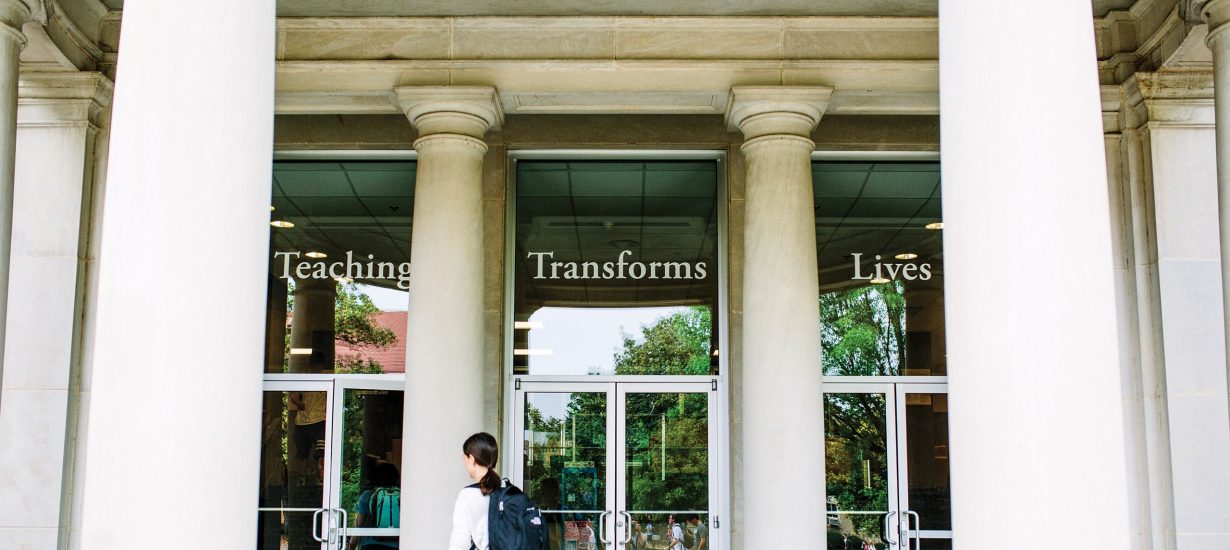
The School of Education changes direction and leadership amid unprecedented challenges.
Bill McDiarmid ’69 left the deanship deeply worried about the impact of funding cuts and enrollment decline. Now he watches to see whether innovative new teacher-preparation programs will work.
New dean Fouad Abd-El-Khalick says, ‘We’ve created a situation where young persons do not want to go and become teachers.’ He advocates that they be given the autonomy to be true professionals.
Stories by David E. Brown ’75
‘An Incredible Tragedy’
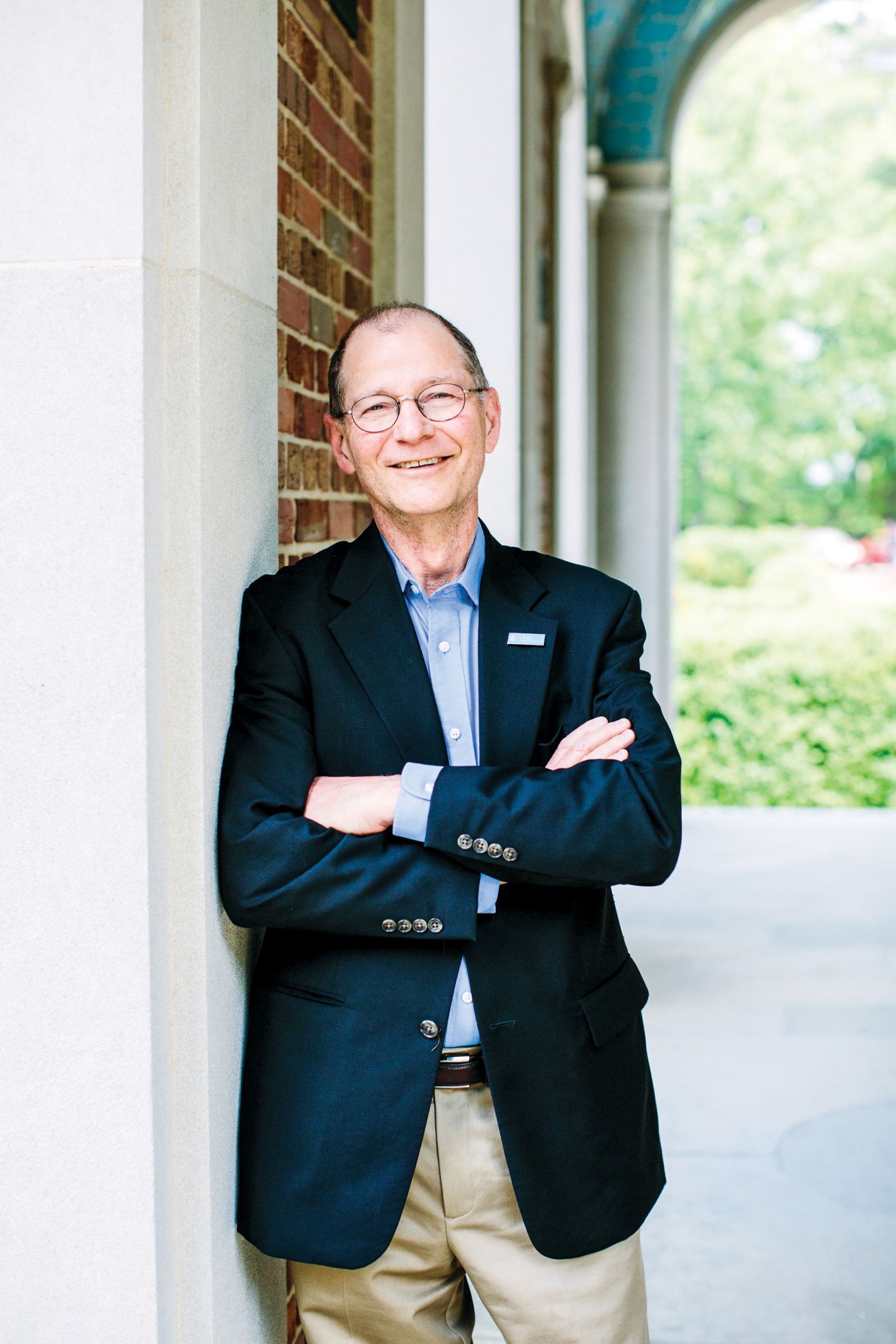
Bill McDiarmid ’69 stepped down this year as dean of UNC’s School of Education. (Photo by Andrea Routh Barzin ’07)
Bill McDiarmid ’69 knew in his senior year at Carolina that he was headed for a career in schooling. As an American studies major, he headed a symposium on urban education at the height of a national movement to find ways to improve urban schools.
He took away an interest in education reform that eventually brought him back to Chapel Hill, where his recently ended seven years as dean of the School of Education were eventful, to say the least.
Enrollment in teacher preparation programs at 15 UNC System universities has plummeted 30 percent over those seven years. McDiarmid estimates that since 2011, Carolina’s school has lost a third of its budget, but also in that time the school established five new named professorships; received its largest private gift ever, of more than $3 million; and witnessed lawmakers in Raleigh hang a much-heralded teaching fellowship program out to die.
McDiarmid is convinced the school made a sound move in restructuring its core program to let students coordinate completion of their bachelor’s degree with a master’s of arts in teaching degree.
Beginning next fall, the school is closing the undergraduate program and creating a clinically based master’s program that will include a yearlong residency in a partner school in the fifth year, providing more extensive classroom experience than most teacher-preparation programs allow. It offers more experience-based preparation for teachers in high-need areas, such as math, science and special education.
The enrollment problem is, in part, the mother of the shift to a master’s. The school doesn’t have the resources to run both.
“I am very, very worried about what’s going to happen with our kids. Somebody has to teach them,” McDiarmid said during an interview in March. “We’re used to having shortages in special education, bilingual, math, science — those we’ve had for as long as I’ve been in the game. But now we have, amazingly, shortages in elementary. Who would have thunk it — we were a few years ago producing a surplus.
“This is an incredible tragedy. And I don’t know if my fellow North Carolinians truly appreciate what a tragedy it is.”
In some places, he said, it’s worse: “In California, their enrollment in their programs is down over 50 percent.” His voice drops to a whisper. “Who’s gonna teach those kids?”
Staffing rural schools and less desirable locations is expected to get harder.
The enrollment decline in education schools has tapered off. Carolina’s enrollment was off only 8 percent last fall. But problems in compensation, professional development and respect for the profession are problems for retaining North Carolina teachers and attracting teachers from outside the state, according to Superintendent of Public Instruction June Atkinson.
“When I saw this coming — it was like the tsunami coming at you,” McDiarmid said. “You had all these things — you had relatively low teacher pay, you had the elimination of tenure, you had the elimination of the supplement you got when you got a master’s degree, you had fairly dramatic changes in curriculum that teachers didn’t necessarily have a lot of control over. … You had generally an atmosphere of negativity toward teachers in public schools. You have leaders of the Legislature standing up and saying our schools are broken.”
Two new paths
The school’s leaders pondered their strengths.
“There are two areas we identified. One was international education — there’s a growing interest nationally and internationally. It could be educating students here, or it could be folks who work in China or in Turkey or somewhere, and they want to start an international school, or they want to teach in an international school or want to be involved in an NGO [nongovernmental organization] that has an educational focus, whatever. But there’s increasing interest in that. We had a number of faculty who had international experience.
“The other area was one that I learned about from my conversations with undergrads. We started an education minor in 2012, and that was another part of the strategy. I brought in some students who I knew were interested, and they were students who were very unlikely to end up in the classroom unless it was to teach for Teach For America, but they were very interested in education policy, the so-called reform movement in education. They were very interested in the affordances of technology when it came to education, and they didn’t know quite where they fit in.
“They were very helpful in thinking about this. So I came up with this idea of reaching out to the business school and their entrepreneurial expertise, reaching out to the computer science department, to the School of Information and Library Science. I said, ‘I got this sort of idea: What if we had a program that brought together the expertises of these different schools for the benefit of students who want to make a difference in education but not necessarily through the conventional route of teacher education?’
“We created a program that would allow them to do things like develop an educational application of some kind or develop an organization, a nonprofit, in education, or a for-profit or get a job with a [company such as] SAS that has a big educational outreach or a Red Hat. That was part of the motivation as well — we have this incredible incubator right here on our doorsteps.”
The school was fortunate, he said, to have a donation that enabled it to create a professorship to help address change and look for solutions. Keith Sawyer, attracted here from Washington University in St. Louis, is now the Morgan Distinguished Professor in education innovation. He spent much of his first year building partnerships all over the area with startups, with companies in the Triangle and with people across the campus.
“MIT guy, started his career at Atari, a game developer, got very interested in the emerging field of the learning sciences,” McDiarmid said, “and he developed this very interesting career where he writes books about creativity that are very popular in the business world, but he also is a world-class cognitive scientist. He also has the ability to translate what he learns from his research into opportunities for lay people. Companies are wild about this stuff.”
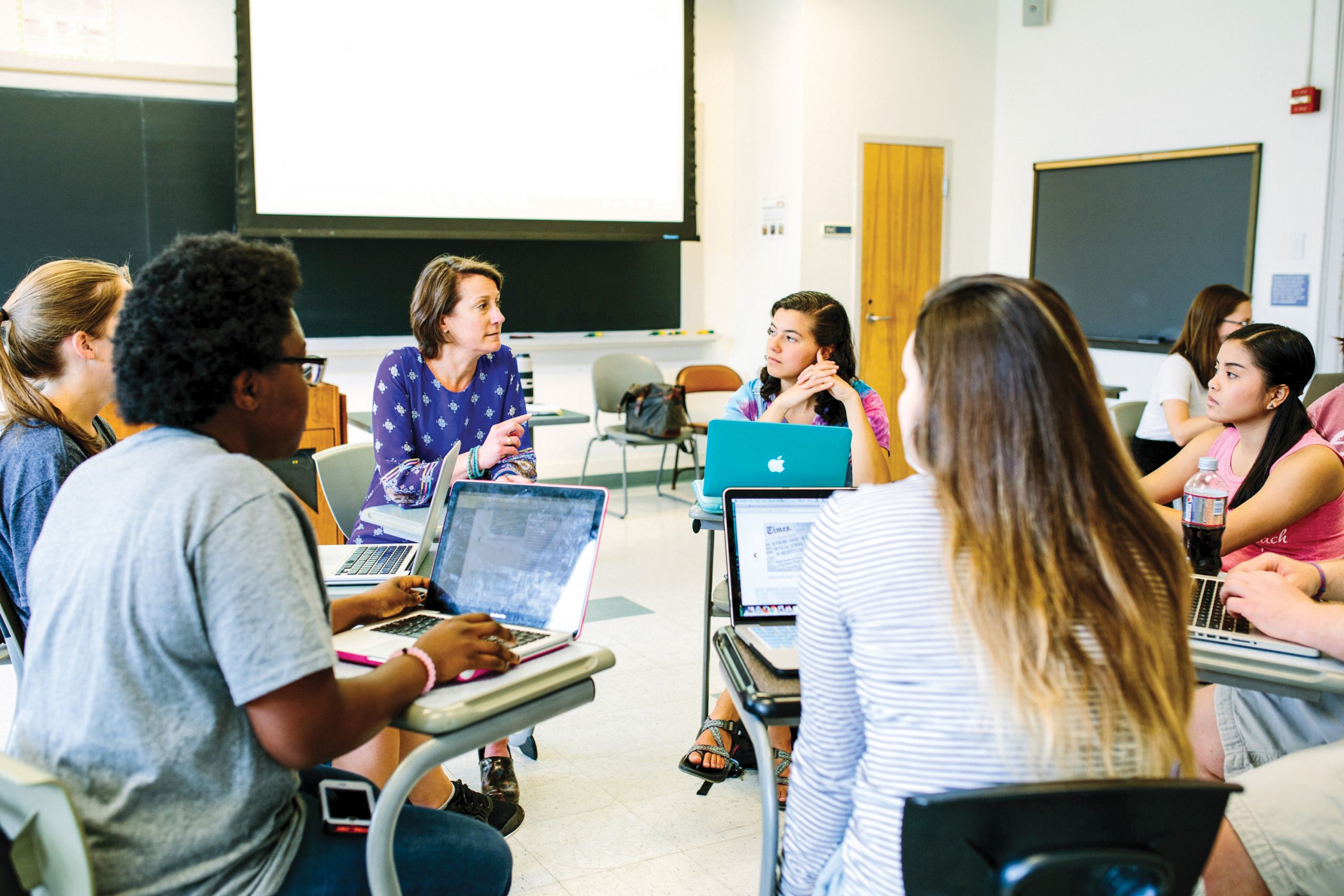
Assistant Professor Cheryl Bolick works with students in the School of Education, which is shifting its focus to a master’s in teaching. (Photo by Andrea Routh Barzin ’07)
No more Teaching Fellows
There was another element to that tsunami that swept in not long after McDiarmid took the deanship: the demise of the Teaching Fellows Program.
Created by business and education leaders in 1986, with the support of then-Gov. James Martin and the N.C. General Assembly, the program was modeled on UNC’s Morehead-Cain Scholarship, financing the undergraduate education of people who agreed to spend at least four years teaching in the state.
More than 8,500 of the nearly 11,000 students statewide who earned the scholarships graduated, and they worked in schools in every N.C. county. Seventeen colleges and universities participated.
It was an unqualified success. About 80 percent of the teachers honored their commitment, and about two-thirds of them taught for six or more years. The program received positive national attention. Then in 2011, the Legislature defunded it.
The impact on UNC, McDiarmid said, was huge.
“When I first came, we were admitting 50 students a year to Teaching Fellows. We had to cut back because of resources issues to 35 in my second year — 35 students a year. But at any given moment on campus, we could have 125 to 150 Teaching Fellows, and that was a sizable chunk of our teacher preparation candidates.
“What we learned is that if you look at the different ways in which teachers enter classrooms, there was no route that produced teachers who produced student learning at the level of the teachers who came through the Teaching Fellows route.
They were very good teachers. And many of them went into high-need areas … hard-to-staff schools. I would love to be able to do a big study and find out how many of those folks would not have come into teaching without the Teaching Fellows Program.”
‘What the new program does, and the students really like this, is it gives them that intensive experience in classrooms and schools.’
More classroom time
“One of the things we’re learned over the last 20 to 30 years of research is that if we want teachers to be ready from day one when they get in a classroom, to help all the students learn, they need to have an intensive experience in classrooms before they take on their own classroom,” McDiarmid said of the new bachelor-master’s program. “What happened with the undergrad program is that because they were often finishing up their requirements for their bachelor’s degree, they had limited time to be in schools. We did our best, but we were always in competition with what they had to do back on campus.
“What the new program does, and the students really like this, is it gives them that intensive experience in classrooms and schools. I helped create a program like this at Michigan State 20-some years ago. What we heard back from the superintendents was that when our graduates went into the classroom, they were more like second- and third-year teachers.”
The new program is set to start in fall 2017. With additional coursework, students will have the opportunity to add specialization in prekindergarten, special education or English as a second language.
Students who obtain their bachelor’s degree from another university also can apply to the program.
“I think that many, many programs around the country are trying to figure out how they provide more intensive experiences in the classroom in collaboration with veteran teachers. I think this is where everybody wants to go.”
The search for solutions
During a year off before he returns to teach in the school, McDiarmid is working on a book about a major effort in the first decade of the new century to use data to improve teacher preparation.
He had said that when he started his tenure at Carolina he thought there was a tendency toward quick, inexpensive solutions to teacher education issues. Recently, he looked back on that.
“I still think at the policy level there’s a view that most of the problems we have can be fixed quickly. The most recent example was this legislative committee that’s working on this special district that would have low-performing schools in it, and the state would take it over, and they would contract with some private entity to run it. If you look at the research on that” — he laughs ruefully — “it’s not very promising.”
He said the N.C. Department of Public Instruction had done a good job of turning around the lowest performing schools. That’s not the point, he said. “The real issue is how do you maintain the momentum once you get them turned around. That’s really the problem.
“So this is an example of policy makers wanting to create something entirely new when we actually have data that says, you know, we actually have a model that’s working in North Carolina — why wouldn’t we invest in that model? If we’ve got a model that’s proved successful, why try something around which the data is much more problematic?”
He returned to the enrollment decline in the education schools.
“So what do school districts do when they’re in this situation? So, North Carolina has a lateral-entry program.
“And here’s the problem: Through lateral entry, sometimes we get very, very good people.” He cited his sister-in-law, who quit her law practice and became a special education teacher. “But overall, we know that the students who are taught by those lateral-entry teachers do worse than just about any other route that teachers come through.
“I think about my people down in Hoke County, in Robeson County. They know — because they have daughters or sons-in-law or whatever that are teachers — they know that something terrible is going on with the schools, and they don’t know quite what to do about it.”
The Trust Factor
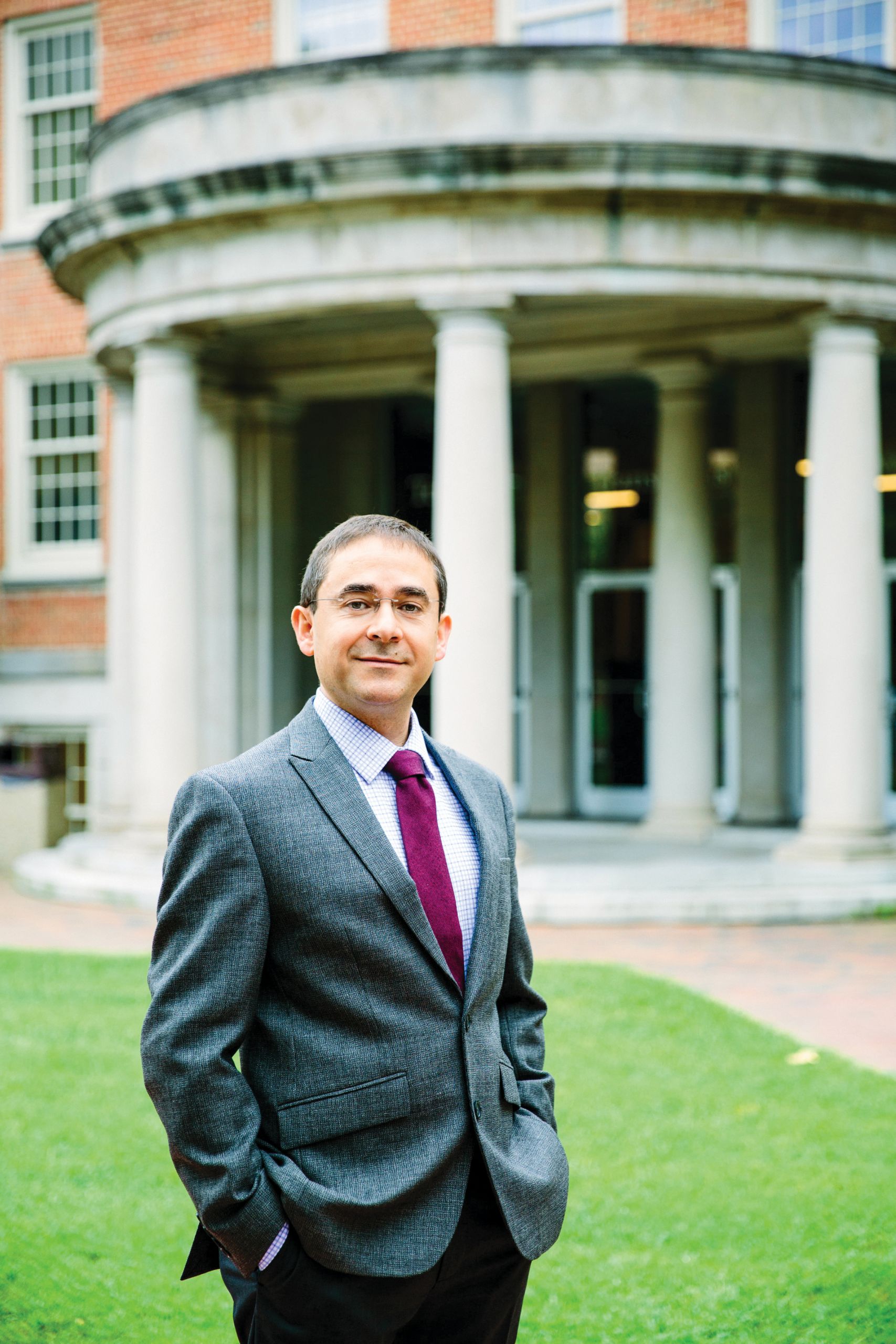
Fouad Abd-El-Khalick came from the University of Illinois at Urbana-Champaign to take over as dean at UNC’s School of Education. (Photo by Andrea Routh Barzin ’07)
A man knocks on a bedroom door, and the voice on the other side says, “No! I don’t wanna go back to school.” He replies, “I know, honey, I know, but you have to.”
“Why?”
“Because you’re the teacher.”
Fouad Abd-El-Khalick offered that cartoon in his presentation as a candidate on his way to becoming the UNC School of Education’s next dean.
The Lebanese-born educator, whom Carolina attracted from the University of Illinois at Urbana-Champaign, seemed to be taking up where his predecessor left off:
“Institutes of higher education have been faced with relentless and substantial decreases in public funding for at least two decades now,” he said. “We’ve created a situation where teachers do not want to go back to school. We’ve created a situation where young persons do not want to go and become teachers.”
The statistics don’t argue with Abd-El-Khalick, no stranger to the enrollment decline in schools of education; he said enrollment of English teachers at Illinois crashed to 17 from 70 in one five-year period.
In 16 years at Illinois, Abd-El-Khalick (AHB-del-KHA-lick) focused his research on the teaching and learning about the nature of science in grades K-12 and in developing ideal classroom settings for science teachers. He has helped develop and lead partnerships involving Illinois and other universities, local school districts and others to improve how science is taught. Most recently, he was associate dean for research and research education in Illinois’ College of Education.
A fortuitous failure
“When you’re growing up in Lebanon, the trick is you either want to be an engineer or a doctor,” Abd-El-Khalick said in an interview on his fourth day on the job at Carolina. “That’s the way to go up the social ladder, if you like. Everybody understands that education is important in Lebanon, and indeed, it’s one of the luminary countries in the Middle East as far as education is concerned. I went into studying science, wanting to become a medical doctor. As much as I excelled in science in high school, as much as I enjoyed that, science and math, my experience with it at the college level was miserable.
“It was all about memorizing things. … I remember not making the cut to go to medical school, and through circumstances, I met the director of the school of education at the American University of Beirut, and he sort of told me, ‘Congratulations on your failure.’ And that sort of, like, blew my mind. Why is this person being mean to me?
“And then he said, ‘You know, this may be your chance to get to learn something about how children learn, because that is a really fascinating world.’ I thought, if this guy, as old as he is, hasn’t figured out how people learn, we have a problem. But the interesting thing is, when I eventually went into education and started learning about teaching and also started doing my master’s in science education, I understood why I had a miserable experience — because that is not the best way to teach science or to educate scientists or to spark creativity or to get people passionate about doing this.”
He earned a bachelor’s degree in biology, a diploma in teaching secondary science and a master’s in science education from the American University of Beirut. He came to the U.S. for graduate school, earning a doctorate in science education from Oregon State University in 1998.
If discovering and disseminating the best ways to teach are the swamp, there are, first, the alligators.
Abd-El-Khalick got straight to the point. “The kind of challenges that are wrapped around education — be it K through 12 or higher education — are almost ubiquitous across the nation. The obvious one we all talk about is the achievement gap, the performance gap when you think about various populations in the U.S., especially the most vulnerable populations. We just cannot move forward as a nation if we don’t close that gap in a meaningful way.
“The other major thing that we have to come to grips with is understanding why we cannot continue this trend of cutting education at all levels.” Abd-El-Khalick cited a July report from the U.S. Department of Education that said state and local spending on prisons and jails has increased at triple the rate of funding for public education for preschool through grade 12 in the past three decades.
“The institutions of higher education in the U.S. are still one of the last footprints in which we are incredibly distinguished in the world. We’re still the largest economy, but all projections show that that’s not going where we want to be. But in terms of knowledge production, we are by far still distinguished in the world. … It just baffles me that we continue to want to not fund this enterprise of higher education, which is the economic engine, the progress engine, the development engine of this nation and the world.”
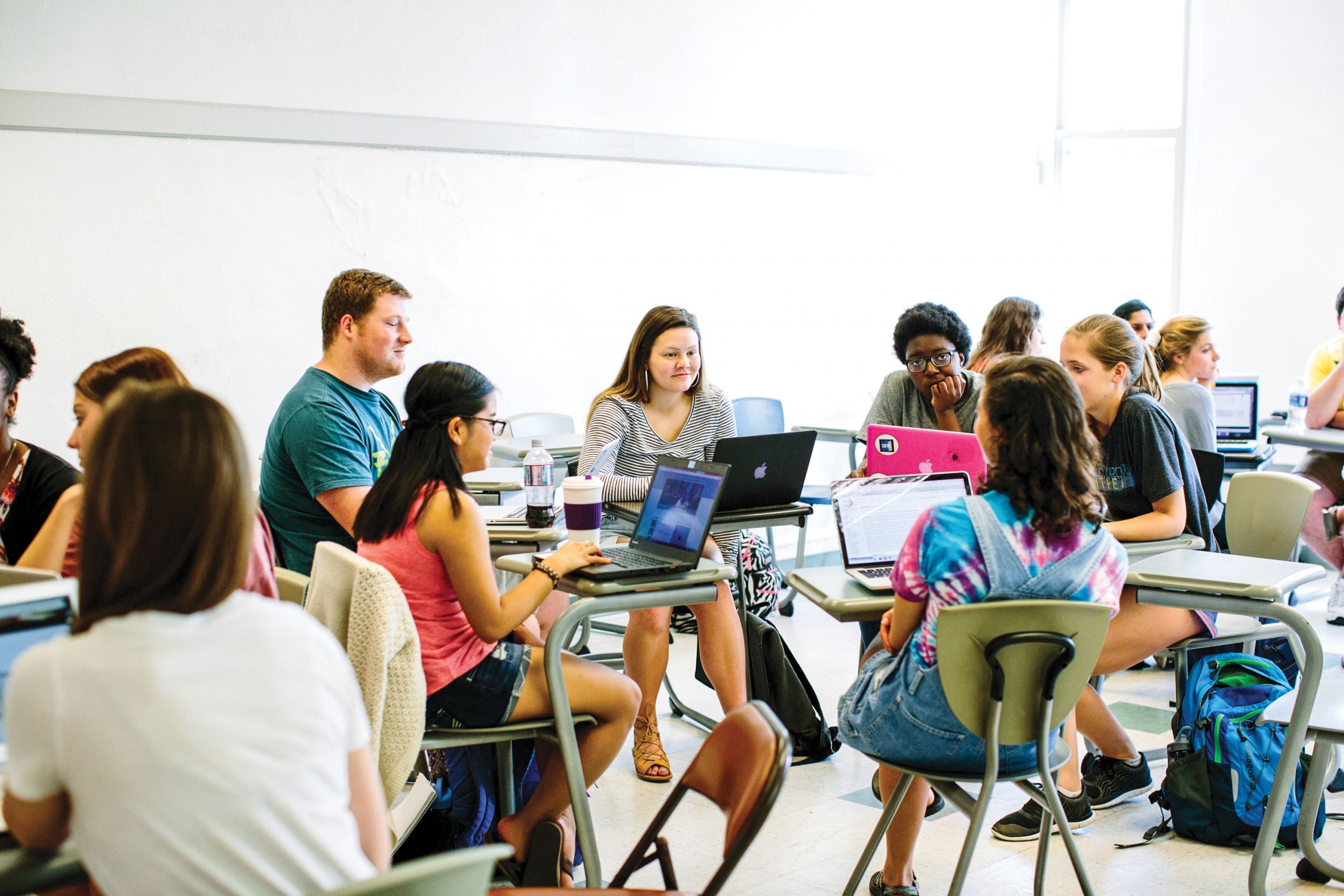
A class meets in the UNC School of Education. (Photo by Andrea Routh Barzin ’07)
Trusting them
A tight hold on the purse strings is one problem. Another, he believes, is that government leaders don’t necessarily trust schools of education to develop professionals as they do, say, in medical schools and business schools. There’s a tendency, he said, “to change this into what I like to call a teacher-proof enterprise. We’re going to tell them exactly what to teach; we’re going to tell them how to teach it; we’re going to drill down to the specific objective; and we’re just going to design these sets of curricula that are going to be proscriptive to tell them exactly what to do, when to do it, how to do it.
“And it’s equivalent to changing teaching and learning into a factory production line, where every teacher will just tighten a screw here and put the part there, and that really defeats what teaching and learning is all about. Some of the most successful education systems in the world — take Finland, for example — you would be shocked at how thin their curriculum is, the proscribed curriculum. There, the teachers are prepared as professionals who have the background, the knowledge, the skills to take this thin curriculum and translate it and transform it into an instructional environment that’s best for those kids.
“By making teaching such a mechanized enterprise, by stealing professionalism out of the professionals who are teachers, who are administrators, we are just alienating a whole generation of teachers. In many ways, we’re almost demonizing teachers. And demonizing schools to some extent.
“What would be a good analogy would be to go and tell a scientist: ‘This is exactly how you’re going to work. Follow this recipe, and you’ll produce knowledge.’ And they would laugh at you. You go to a writer and say, ‘Here is the formula for producing the next novel, and you’re going to get a great work of art.’ Or, ‘Here [are] 60 different techniques for touching your brush against a canvas.’ If you think about it, it’s just absolutely absurd to think that it’s a proscribed activity.
“We could be, in this school, preparing teachers to teach in the 21st-century classroom and promise that they are going to make a difference in the lives of students — and then they go to our schools now where they cannot purchase textbooks, let alone robust, meaningful technologies. That sort of nulls our expectations. The other thing I think is important to talk with the legislators is about the importance of preparing teachers who are professionals, meaning we’re going to have high standards for preparing them. But then trusting them.”
‘I envision a world-class school of education that is a national and global leader in anything we choose to do.’
What Carolina needs
Abd-El-Khalick’s response to a question about the school’s new direction was tentative, reflecting what he said was an orientation as yet incomplete. The shift to a bachelor-master’s program includes a yearlong residency in a partner school in the fifth year, providing more extensive classroom experience than most teacher-preparation programs allow. His predecessor acknowledged that the enrollment decline has left the school without the resources to run both undergraduate and master’s programs.
Some education schools are focused on graduate programs, Abd-El-Khalick said, others on undergraduate, “especially in elementary, special education, early childhood education, where they come to you as undergraduates. And other places it’s a hybrid — at Illinois, for example, in the same classroom that’s teaching science methods, you would have some undergraduates and you would have people who are graduates, and then you would have somebody who’s coming back from a professional practice to shape up.
“That, in many ways, is driven by philosophy, is driven by economics, is driven by preference, driven by admissions policies of the schools — so to be honest, I have yet to wrap my mind fully around the details here. To be honest, I don’t think there’s a magic bullet in answering this one question.”
Could the changeover be reversed?
“That would be something that the faculty have to come together around. People [ask] me about what my vision is. I say, ‘Well, that’s not my job. My job is to get the faculty together and come up with a vision.’ I envision a world-class school of education that is a national and global leader in anything we choose to do.”
(In his candidate presentation, he said something similar: “The question of a dean bringing a vision to a place is a really strange proposal. What you guys need to do is have those difficult discussions. The vision needs to come from you, not from me. My job is to create the conditions that allow you to thrive.” His presentation is online at bit.ly/UNC_Educ_Dean2016.)
To his strategy for combatting the enrollment decline, Abd-El-Khalick said: “We need to be out there to, number one talk about the Carolina advantage. We need to be out there with the message of reminding our incoming students as well as students we’re recruiting from the high schools that if you’re interested in changing the world, this still is the place where you want to be.”
That includes actively recruiting. “This whole notion of we’re here, we’re Carolina and you’re going to come to us — that’s not going to work.”
He also is certain of something else: Raising private money and going after grants are essential to the school’s financial health, and he thinks UNC may be behind.
“As far as the grants, we can do much, much better.” At Illinois, he said, there are six full-time staff members whose only job is to help faculty apply for grants.
“We don’t have this infrastructure here — we need to think about ways to do this.”
David E. Brown ’75 is senior associate editor of the Review.
Thanks for reading the Carolina Alumni Review
Carolina Alumni members, sign in to continue reading.
Not yet a member? Become one today.
